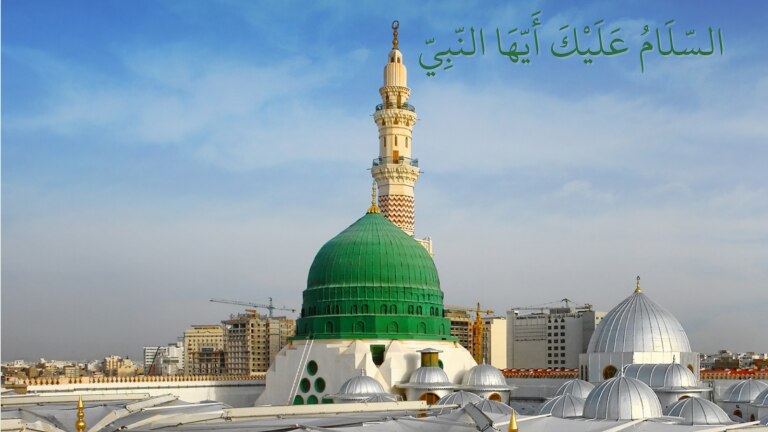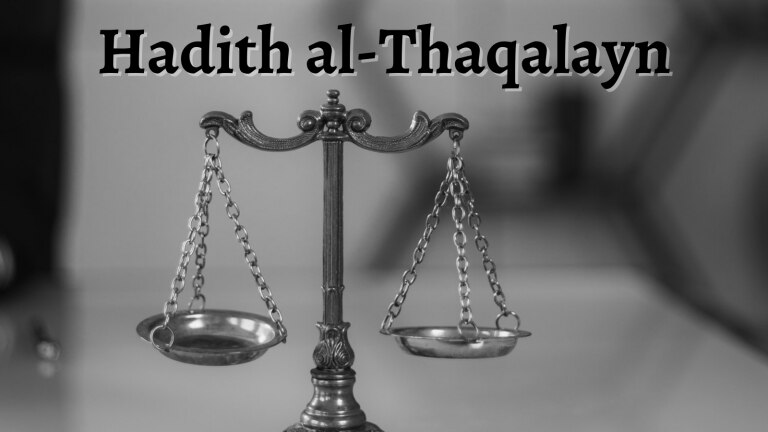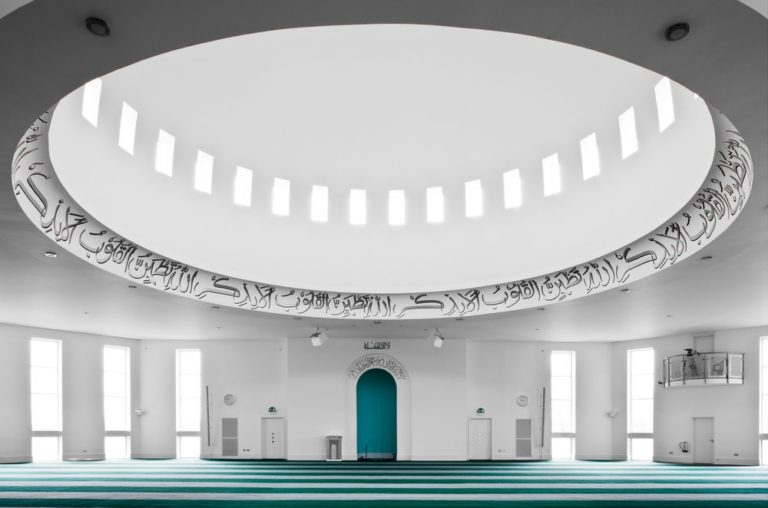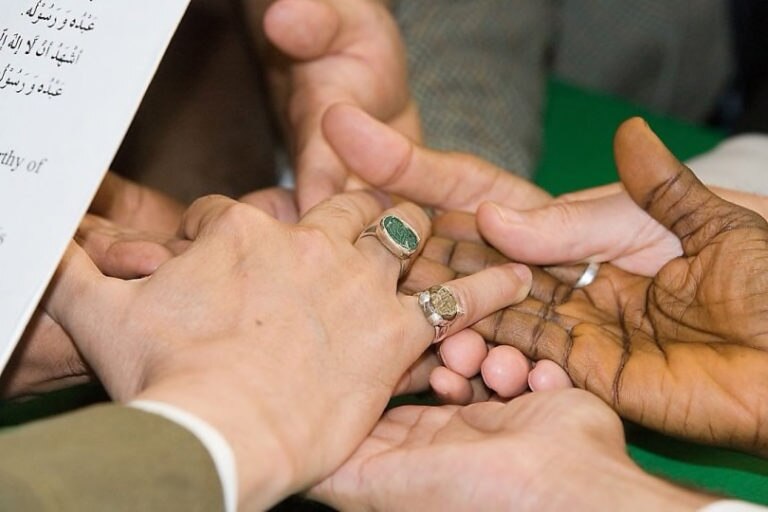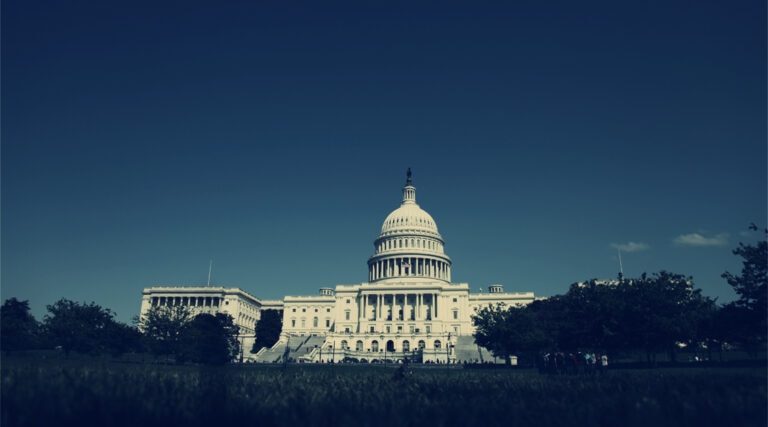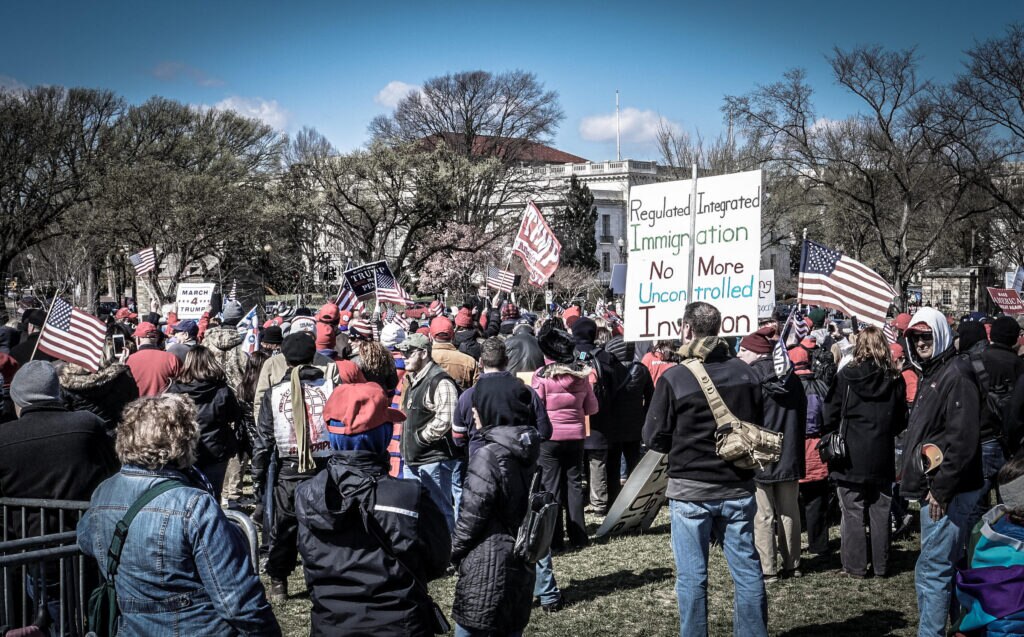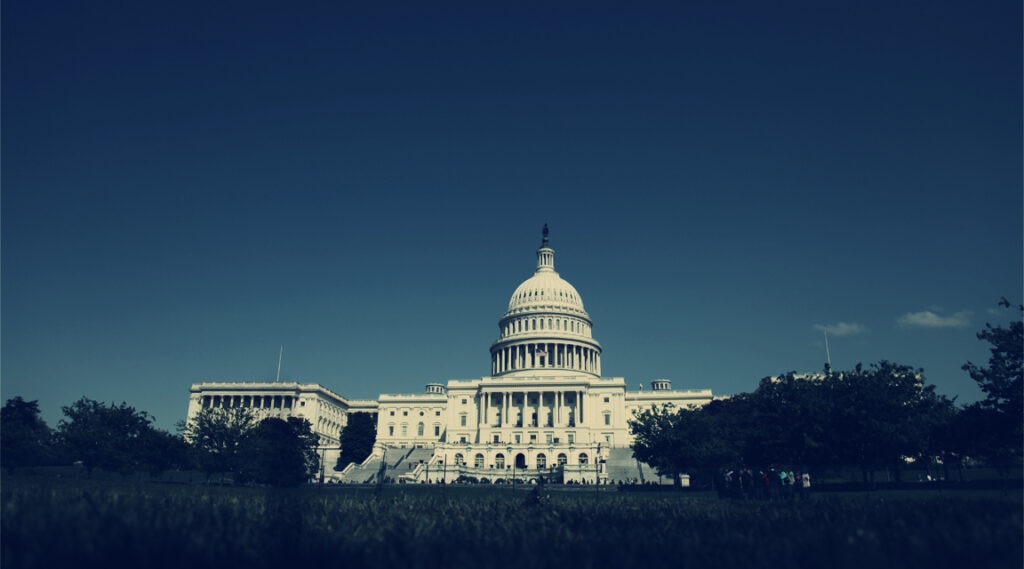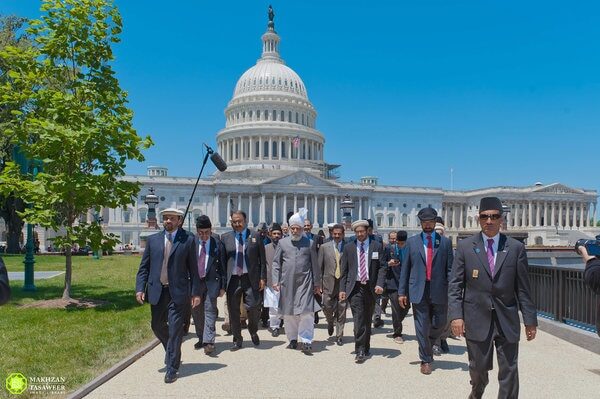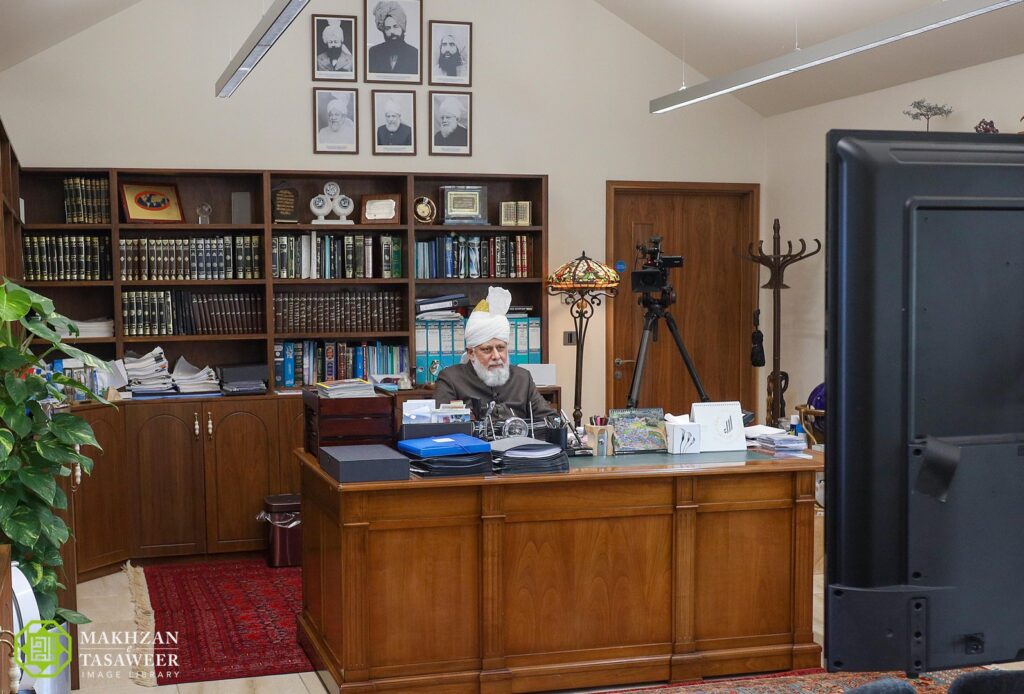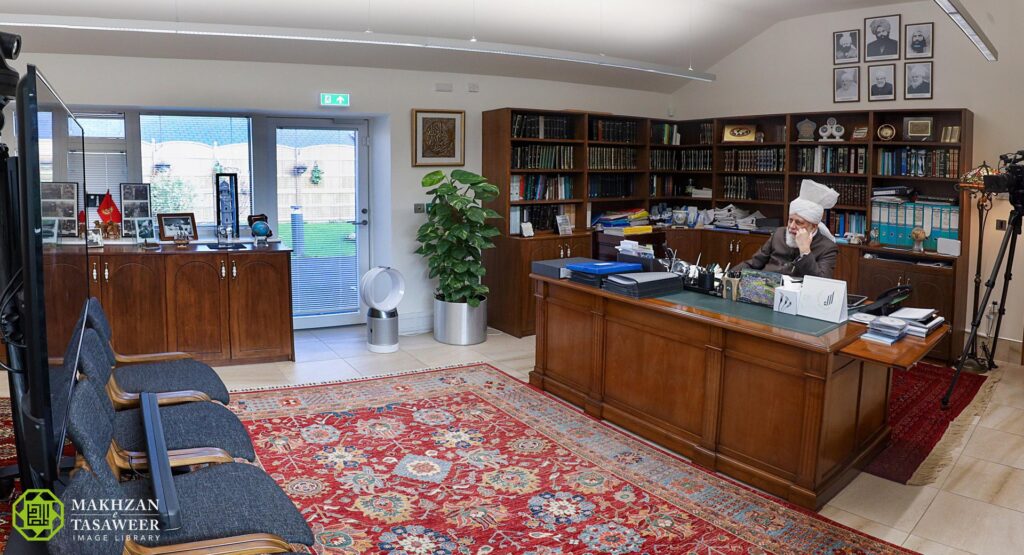On 2 January 2021, the national amila of Lajna Imaillah UK were blessed with the opportunity of meeting Hazrat Amirul Momineen, Khalifatul Masih Vaa through a virtual mulaqat.
Upon seeing the amila members seated in the Tahir Hall of Baitul Futuh Mosque complex, Huzooraa smiled and said he was seeing the Tahir Hall of Baitul Futuh once again, after a year.
Hazrat Khalifatul Masihaa then led everyone in silent prayer, after which various departments’ secretaries began introducing themselves and presenting their annual reports.
The first report was presented by Naib Sadr and Secretary San‘at wa Dastakari (cottage industry and handicraft), Safiya Salam Sahiba. During the report, Huzooraa asked various questions while also giving valuable advice and direction to improve the department.
Safiya Salam Sahiba reported that during lockdown, Lajna UK had made and distributed 86,890 masks, 1,045 sets of scrubs and 3,841 scrub bags to keyworkers with the help of the khidmat-e-khalq department.
Naib General Secretary, Zuna Khan Sahiba was next to present her report. She reported that there were a total of 140 majalis in Lajna UK. Huzooraa asked various questions including how many majalis, out of the 140, sent regular reports and whether each secretary received feedback and comments on their report.
Zuna Sahiba explained that 100% of the majalis sent reports and feedback was given to each secretary. Huzooraa emphasised that all majalis should be kept in contact and said to sadr Lajna that she should contact each sadr at least 2-3 times a month.
After this, Sadr Lajna UK, Dr Fariha Khan Sahiba said she contacted sadraat once to twice a week. Huzooraa smiled and said, “Very efficient, masha-Allah”.
Farzana Yousaf Sahiba, Secretary Tabligh, presented her annual report next in which she said a total of 29 ladies had converted to Ahmadiyyat and done Bai‘at in the last Lajna year. Huzooraa asked her what the annual target for tabligh was; she responded by saying that they aimed to see 140 women enter the fold of Islam Ahmadiyyat.
Hazrat Amirul Momineenaa said, “Why not one Bai‘at for each national amila member? … Give this target to amila members; activate them also in this field.”
Farzana Sahiba said she would act on this, insha-Allah.
Regarding the coffee morning initiative – in which Lajna members preach to other women wanting to know more about Islam over a cup of coffee – Huzooraa asked how these coffee mornings were still being held in the current climate.
Farzana Sahiba explained the coffee mornings were now held virtually. Huzooraa asked how coffee was being provided to the women during a virtual meeting. Farzana Sahiba replied that the coffee was arranged individually and not from the tabligh department.
Huzooraa, with a smile, said, “Then you should at least pay for the coffee of those who are in contact with you.”
Next, Farzana Sahiba reported that special attention was paid in the last year to distribute leaflets about Islam, especially regarding the rights and role of women in Islam – 35,683 Jamaat leaflets and books were shared with contacts.
Hazrat Amirul Momineenaa asked what the expected target was for this year in distributing leaflets and books, to which Farzana Sahiba said they aimed to double the figure.
The report further detailed the aim of Lajna Imaillah UK to increase relations with schools and to ensure the teachings of Islam were conveyed to students from a young age.
Commenting on this, Huzooraa said, “I know that the majority – 90% of the schoolteachers – are ignorant about the true teaching of Islam; this is why sometimes the way they speak about Islam disturbs the minds of our children. So you should try to start a campaign on this issue.”
Thereafter, Secretary Finance, Shafqat Khokar Sahiba presented her report. Hazrat Amirul Momineenaa enquired about targets, their fulfilment and other matters concerning budgets and savings.
Regarding savings, Huzooraa asked whether a plan was in place regarding where to spend the saved amount from the Ijtema chanda, as the Ijtema was not to take place. In response, Sadr Sahiba asked Huzooraa if they could spend the chanda towards the new maternity hospital in Sierra Leone being built through the funding of Lajna UK.
In response, Hazrat Amirul Momineenaa said, “I have learned that some of your members are raising this question, that since you are not going to hold the Ijtema, why are you collecting Ijtema chanda? Tell them that you are going to use it for a hospital.”
Nasirat Secretary, Mateen Bhatti Sahiba was next to present her report. She reported the total Nasirat tajnid was 2,211. Huzooraa asked what special plan was given to Nasirat members during the Covid-19 pandemic. Mateen Sahiba detailed the virtual events and discussions that had taken place.
Huzooraa then asked, “What slogan have you given to the Nasirat for this year? There should be some motto.” Mateen Sahiba said there was nothing given yet.
Huzooraa then gave the slogan for the year, saying:
الحَیَاءُ مِنَ الْاِیْمَان
“[Modesty is part of faith] … This will cover quite a number of things which will help you to do tarbiyat of your Nasirat.”
Nasirat Secretary thanked Huzooraa for the motto and Sadr Sahiba also added that indeed, this motto covered a wide range of topics, which they had previously planned to cover with Nasirat.
Secretary Tajnid, Fakhira Safeer Sahiba was next to report. Huzooraa asked what the total tajnid of Lajna Imaillah UK was. Fakhira Sahiba said Lajna members totalled 11,906, an increase of 5% from last year.
Huzooraa emphasised that Lajna Imaillah should not only rely on the tajnid data given by the Jamaat centre, but ought to carry out their own work too.
Secretary Ishaat, Lubna Sohail Sahiba was next to present her report. Hazrat Amirul Momineenaa asked, “During this Covid period, what have you published?”
Lubna Sahiba reported that seven books had been approved for printing, while another seven books had been submitted for approval.
Huzooraa also enquired about the topics of the books and gave advice on how to overcome delays during the publishing process. Many other projects were detailed by Lubna Sahiba, including projects on the history of Lajna Imaillah and various programmes produced by Lajna MTA UK.
Secretary Sehat-e-Jismani, Nina Qudsia Ahmad Sahiba reported on the achievements of the last Lajna year, with the European volleyball tournament that took place in February 2020 and a virtual sports week that saw 500 participants. Mental health initiatives, raising awareness for healthy eating and exercise and providing updates on the pandemic were amongst other activities of the department.
Hazrat Khalifatul Masihaa said to encourage Ahmadi women to go for walks: “Now, even during Covid, parks are open and individuals can go for exercise or for walk. So, why don’t you encourage your Lajna members to go outside and walk? … Instead of walking on the streets, they should go to the parks.”
Secretary Tarbiyat for New Converts, Nusrat Safir Sahiba was next to introduce her department. Huzooraa asked the number of new Lajna converts; Nusrat Sahiba replied by saying in the last three years, there were 58 new converts. She further reported that new converts were being provided support in learning Surah al-Fatihah with translation, according to Huzoor’s instructions. 65% of them had learned the chapter of the Quran thus far.
Nusrat Sahiba reported that conference calls and book clubs for new converts were held throughout lockdown too. Giving further advice, Huzooraa said, “Try to attach them with MTA as well.”
Secretary Tahrik-e-Jadid and Waqf-e-Jadid, Amatul Wadood Sahiba reported on her department next. After hearing the report on the chanda for Waqf-e-Jadid and Tahrik-e-Jadid, Huzooraa asked “So your share is one third of the total income collected by the UK Jamaat?”
Wadood Sahiba confirmed and said that she thought it was a little higher than one third, to which Huzooraa remarked, “Masha-Allah!”
Secretary Umur-e-Talibat, Dr Qurratul-Ain Rahman Sahiba introduced her department. Huzooraa asked how many students went to university and how many were pursuing PhDs or postgraduate degrees.
Dr Sahiba reported that 825 students currently went to university, seven of whom were PhD students and 76 students were pursuing their master’s. Qurratul-Ain Sahiba reported that 25% of Lajna university students went to the top Russell Group Universities. The three most studied courses by Lajna students are psychology, medicine and law, according to the report. Interestingly, 14% of the whole Lajna UK population were students.
The umur-e-talibat report highlighted the activities held by the department in the previous Lajna year, including the mulaqat with Huzooraa in which 255 Lajna university students attended. A meeting was also held with national sadr Lajna UK with 32 medical students, informing them of the Ayesha Maternity Hospital in Sierra Leone (being built by funds raised by Lajna UK).
Regarding the maternity hospital, Huzooraa asked, “Will they dedicate their time or [do] waqf for a few years for the hospital?”
Sadr Sahiba replied by saying the meeting was for this purpose; to encourage Lajna medical students to go into specialisations (such as obstetrics and gynecology) so that they could dedicate their lives and serve in the maternity hospital – the students welcomed the idea.
Huzooraa approved and said, “But after having completed your hospital, lajna also has to run that hospital and you have to provide the doctors to the hospital.”
Secretary Ziafat, Rashida Naeem Ahmad Sahiba introduced her department next and reported the year’s focus was on teaching food etiquettes, various tutorials and serving food at Lajna events (prior to the pandemic).
Huzooraa remarked food or refreshments should also have been arranged for the amila members after the meeting. Huzooraa further advised that food banks should be aided, such as those of Humanity First.
Sadr Sahiba reported to Huzooraa that Lajna UK, through khidmat-e-khalq department, had donated to the food banks of Humanity First.
Following this, naib general secretary, various muavina sadrs and the national auditor also introduced themselves and their assigned roles.
Muavina Sadr Press and Media, Shermeen Butt Sahiba then introduced herself. Huzooraa noted that she also served in the Voice of Islam radio station and asked what the feedback from both Ahmadis and non-Ahmadis was regarding her programmes.
Shermeen Sahiba said the feedback was positive and people enjoyed the in-depth radio shows.
Hazrat Amirul Momineenaa also enquired if the Lajna press and media team coordinated with the central Jamaat press and media team.
Shermeen Sahiba said that they did so and explained that they worked independently too.
Huzooraa continued to ask more questions, for example how many articles were written in renowned newspapers in the last three months and how many writers were active.
Shermeen Sahiba Sahiba said that four or five Lajna members were active in writing letters and articles for newspapers etc. Huzooraa responded by saying, “You should increase your team; there should be no less than 500.”
Shermeen Sahiba also gave details about an online Lajna blogpost and expressed the positive feedback they received from non-Ahmadis who read the articles, especially those concerning spirituality.
Muavina Sadr and in-charge Wasiyyat, Manahil Tahir Sahiba introduced herself next. Huzooraa asked Manahil Sahiba how many Lajna members were musis, to which she said that there were 3,622.
Huzooraa then enquired about the total number of earning members and said that the number of musis amongst earning members of Lajna still needed to increase.
Muavina Sadr for Waqifaat-e-Nau, Dr Shahnaz Ahmad Sahiba introduced herself. Amongst other questions, Huzooraa asked if the waqifaat-e-nau were following their prescribed syllabus, what strategies were in place to check they were and whether respective waqifaat-e-nau secretaries were in regular contact with the waqifaat-e-nau of their majalis.
Shahnaz Sahiba detailed how they taught and tracked syllabus learning and confirmed secretaries were in regular contact.
Huzooraa asked whether secretary tarbiyat had a good plan for the year and what the plan was. Hazrat Amirul Momineenaa, regarding the tarbiyat department, said:
“Your target should be that 100% of Lajna members should observe Salat regularly five times. Since they are sitting in their houses, there are no excuses that now time is short etc. … They should offer prayers five times daily so that their children are also trained in this way.
“Secondly, 100% of your Lajna members should do tilawat regularly [of the Holy Quran] and during this Covid period, at least 75% of the households should have arrangement of giving dars in their houses of any of the Promised Messiah’sas books or a short commentary of hadith. And 100% of your Lajna members should listen to my sermons.
“Yesterday, I have entrusted some tasks to you at the end of my khutba – to each and every member of the Jamaat and you are also among them. Don’t think that a separate message will be sent to you.”
Huzooraa asked Sadr Sahiba when they would hold the next meeting with him. Sadr Sahiba, jubilantly, expressed that they were ready to meet Huzooraa the very next day!
Huzooraa responded by saying he was going to hold a virtual meeting with new Lajna converts from Germany the next day and asked Nusrat Sahiba, Secretary for new converts to plan for a similar meeting with Hazrat Khalifatul Masihaa and new lajna UK Ahmadi converts.
Thereafter, Hazrat Khalifatul Masihaa concluded the meeting by conveying salaam to all the amila members.

